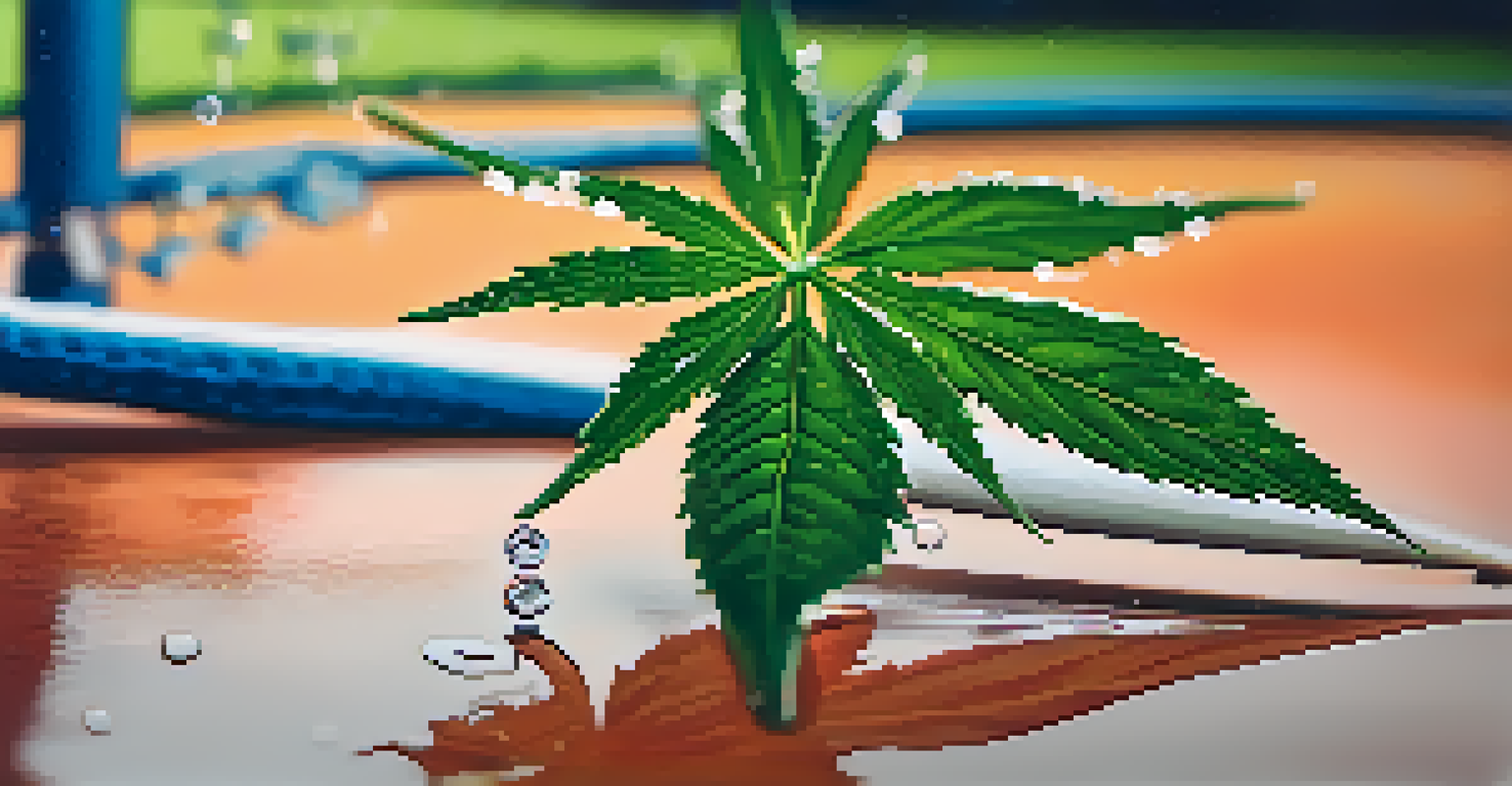Marijuana and Mental Health: Effects on Athletes' Performance

Understanding Marijuana: Types and Uses in Sports
Marijuana, derived from the Cannabis plant, contains compounds called cannabinoids, the most notable being THC and CBD. THC is the psychoactive component that produces a high, while CBD is non-psychoactive and is often touted for its therapeutic benefits. Athletes may use marijuana for various reasons, including pain relief, anxiety reduction, and even to enhance focus during competition.
The greatest weapon against stress is our ability to choose one thought over another.
As sports continue to evolve, so does the conversation around marijuana use. Many athletes have turned to it as an alternative to traditional pharmaceuticals, which can come with a laundry list of side effects. This shift has led to a growing interest in understanding how marijuana impacts not only physical performance but also mental health.
It's essential to distinguish between recreational and medicinal use. While recreational use might be geared towards relaxation or social enjoyment, medicinal use often focuses on addressing specific health issues, such as chronic pain or anxiety, which many athletes face regularly.
The Link Between Mental Health and Athletic Performance
Mental health plays a crucial role in an athlete's performance. Stress, anxiety, and depression can significantly hinder focus, motivation, and overall physical capabilities. Just like any other profession, athletes face immense pressure to perform, which can lead to mental health challenges that impact their game.

When athletes experience mental health issues, their performance may decline. This can manifest as decreased concentration, poor decision-making, or a lack of energy. Understanding this relationship is vital for athletes who want to maintain peak performance and overall well-being, especially in high-stakes situations.
Marijuana's Impact on Athletes
Athletes may use marijuana for pain relief and anxiety reduction, but its effects on performance can vary significantly.
Moreover, mental health struggles can lead to a vicious cycle where poor performance exacerbates mental health issues, creating a feedback loop that is difficult to escape. By addressing mental health proactively, athletes can enhance not only their performance but also their quality of life.
How Marijuana Affects Mental Health in Athletes
Research suggests that marijuana can have both positive and negative effects on mental health. For some athletes, it may alleviate symptoms of anxiety and depression, providing a sense of calm and relaxation. This could enhance their focus and mental clarity, making it easier to perform under pressure.
Mental health is an ongoing process of dedication to self-care and wellness.
However, marijuana can also lead to cognitive impairments, such as decreased memory and altered judgment. This means that while it may help some athletes relax, it could hinder their ability to think quickly and make strategic decisions during competition. It's a delicate balance that each athlete must navigate based on their personal experiences and needs.
It's also important to consider the stigma surrounding marijuana use in sports. Despite its growing acceptance, some athletes may feel pressured to avoid it due to fear of judgment or potential consequences from governing bodies. This adds another layer to the complex relationship between marijuana, mental health, and athletic performance.
The Role of CBD in Athletic Performance
CBD, unlike THC, is non-psychoactive and has garnered attention for its potential benefits in sports. Many athletes report using CBD to help with recovery, reduce inflammation, and promote better sleep. These factors can contribute significantly to an athlete's overall mental health and performance.
The fact that CBD is legal in many places and not banned by most sports organizations has made it increasingly popular. Athletes appreciate that they can potentially gain the benefits without the high associated with THC, allowing them to maintain focus and clarity while still managing stress and pain.
Mental Health and Athletic Success
Mental health is crucial for athletes, as issues like stress and anxiety can directly affect their performance on the field.
However, as with any supplement, it's essential for athletes to do their research. The market for CBD products is vast and varied, and not all products are created equal. Athletes should look for high-quality, third-party tested options to ensure they are getting the most benefit without any harmful additives.
Legal Implications of Marijuana Use in Sports
The legality of marijuana use varies widely across regions and sports organizations, creating a complex landscape for athletes. Some states have legalized marijuana for recreational or medicinal use, while others maintain strict prohibitions. This inconsistency can put athletes in precarious positions when it comes to their choices.
In professional sports, organizations like the NFL and NBA have begun to reevaluate their policies regarding marijuana use. Some have adopted more lenient approaches, recognizing the potential benefits while still ensuring athletes are not using it as a performance enhancer. This evolution reflects a broader societal shift towards accepting marijuana as a legitimate treatment option.
Athletes must stay informed about the rules governing their sport to avoid penalties or sanctions. Understanding the legal implications is crucial for maintaining both their health and their careers, especially as the conversation surrounding marijuana continues to change.
The Importance of Individual Assessment
Every athlete is different, and their response to marijuana can vary widely. Factors like genetics, personal health history, and the specific demands of their sport all play a role in how marijuana affects them. What works for one athlete may not work for another, making individualized assessment key in determining the best approach.
This individualized approach also extends to mental health. Some athletes may find that marijuana exacerbates their anxiety rather than alleviating it, while others may experience significant benefits. Understanding personal triggers and responses is crucial for making informed choices about marijuana use.
CBD as a Performance Aid
CBD is gaining popularity among athletes for its potential benefits in recovery and inflammation reduction without the psychoactive effects of THC.
Ultimately, athletes should consult with healthcare professionals who understand both sports and mental health. This collaboration can help them develop a tailored strategy that considers their unique needs and performance goals, leading to healthier choices and better outcomes.
Future Research Directions in Sports and Marijuana
The intersection of marijuana use and athletic performance is ripe for further research. As societal attitudes shift and more athletes embrace marijuana, understanding its long-term effects on mental health and performance will become increasingly important. This research could provide valuable insights that benefit athletes, coaches, and sports organizations alike.
Future studies should focus on the specific conditions under which marijuana may enhance or hinder performance. By examining different strains, dosages, and methods of consumption, researchers can identify best practices for athletes looking to incorporate marijuana into their routines.

Moreover, exploring the psychological aspects of marijuana use in sports can shed light on how it affects motivation, focus, and resilience. By understanding these dynamics, stakeholders can create more supportive environments for athletes, promoting both mental health and athletic success.